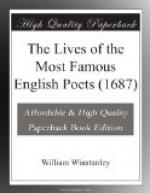Though Winstanley’s Lives advertises on its title page accounts “of above Two Hundred” poets, only 147 are actually listed in the catalogue, and only 168 are noted throughout. Of these 168, only 34 had not already been mentioned by Phillips, a dozen years before. Some borrowing was inevitable, and, in fact, Winstanley leaned heavily upon both Phillips and Fuller for information and clues, just as Phillips had leaned heavily upon Bale’s Summarium (1548), Camden’s Remains, Puttenham’s Art of English Poesy, several Elizabethan miscellanies, and Kirkman’s play catalogues. Both men built (as scholars must build) upon the obvious materials available. Both (in the manner of their age) were extremely casual about documentation and acknowledgment. If this leads us to talk unhistorically about “theft,” we must say that Phillips “stole” from a half dozen or so people, whereas Winstanley simply appropriated a lot of these stolen goods. For doing so, he alone has been labelled a plagiarist.
Let us be more specific. Of Winstanley’s accounts of 168 poets, 34 seem to have come out of the Theatrum Poetarum with nothing new added (10 of these 34 merely named). Of the remaining 134 accounts, 34 are of poets not mentioned by Phillips, 29 are utterly independent of Phillips, 40 are largely independent (that is, they borrow some from Phillips but add more than they borrow), and 31 are largely derivative. We would praise a doctoral dissertation that succeeded in giving so much new data. Winstanley was careless, but he was not lazy, and he had a literary conscience of sorts. Often he went to Phillips’ sources and came away with more than Phillips found (most conspicuously in his use of Francis Kirkman’s 1671 play catalogue).
Since the groundwork had so recently been laid, Winstanley’s problem, far more than that of Phillips, was one of selection. In the Theatrum Poetarum 252 modern British poets are named. Of these Winstanley chose to omit the 16 female and 33 Scottish poets. Of the remaining 203, he dropped 68, and for the student of literary reputation these omissions raise some interesting questions. Undoubtedly a few were inadvertent. About a dozen were authors noted but not dated by Phillips, and it is probable that Winstanley was unable to learn more about them. Fifteen others were English poets who apparently did not write in the vernacular. An additional fifteen were poets dated by Phillips but described as inferior or almost forgotten. Still another fifteen were older or early Renaissance poets whose names probably meant nothing to Winstanley. On the other hand, he omits the following late Renaissance or contemporary poets whose period is plainly indicated in the Theatrum Poetarum and who, we might suppose, would be known to anyone attempting literary history in the year 1687: Richard Barnfield, Thomas Campion, Francis Davison, John Hall of Durham, William Herbert, William Leighton, Thomas Sackville, Henry Vaughan the Silurist, and Samuel Woodford.




